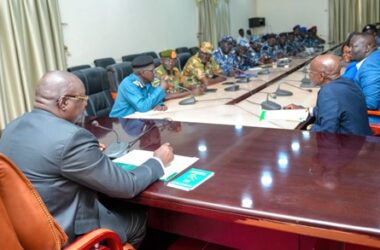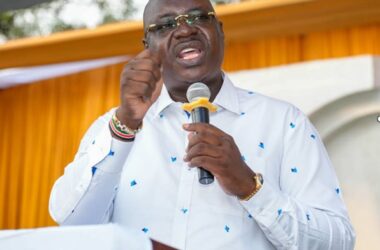By James Innocent and Jacob Onuha Nelson
Over 1,000 households in Panyume Payam and Kendila Boma of Morobo County have been displace as a following confrontations between South Sudan People’s Defense Forces (SSPDF) and Sudan People’s Liberation Army-In Opposition (SPLA-IO).
The intense violence has triggered widespread fear among the local population, compelling numerous families to abandon their residences in a desperate bid for safety.
Many of those fleeing—particularly children, women, and the elderly, have sought refuge at Morobo County administrative headquarters, where they face an increasingly grim reality.
Upon their arrival, the displaced families painted a bleak picture of their circumstances, voicing urgent worries about the scarcity of food, clean water, and essential supplies that they were forced to leave behind in the chaos of the clashes.
In response to the unfolding humanitarian emergency, the county’s relief and rehabilitation desk, along with dedicated volunteers, mobilized efforts to provide temporary shelter for the influx of displaced individuals.
Churches and school buildings are being repurposed to accommodate those in urgent need of refuge.
Charles Data Bullen, the Commissioner of Morobo County, provided an update on the situation, revealing that the SSPDF forces have secured significant areas, including Kendila, Kenyira, and Yondu.
He expressed optimism for improved security in the near future, citing the impending arrival of additional troops to bolster the local defense efforts.
Commissioner Bullen urged the displaced families to promptly register with the Relief and Rehabilitation Commission (RRC) to ensure they gain access to vital emergency assistance.
He also reassured local business owners to remain active in their ventures, emphasizing that the current turmoil is likely temporary and that stability will soon return to the area.
Meanwhile Activist Edmund Yakani has condemned the displacement in Morobo County of families who had voluntarily returned to their homes from refugee camps in Uganda and the Democratic Republic of Congo (DRC).
“This violence has led to the further displacement of our own citizens who decided voluntarily to return from refugee camps in Uganda and Congo to their homes in Morobo County to engage in agricultural activities,” Yakani stated.
He emphasized the devastating impact of the renewed violence on the returnees’ lives and livelihoods.
“Now their interest in staying back home and engaging effectively in agriculture has been disrupted. They are now further displaced because of this violence. As an activist, we strongly condemn the use of violence to resolve political differences in the Panyume area, and we note similar incidents in other parts of the country, including Upper Nile and Western Equatoria State,” he said.
Yakani expressed deep concern about the country’s trajectory away from peace.
“The way we are behaving in transitioning our country from violence to peace sadly echoes the concerns once voiced by Sudanese youth. Their apprehension that South Sudanese would struggle to manage their affairs and instead engage in violence seems to be materializing.
Despite this unwelcoming outlook, Yakani appealed to South Sudan’s leaders, “we still believe our leaders have a significant opportunity to take primary responsibility for transitioning the country from violence to peace, as they have repeatedly promised in public speeches. They assured us that under their leadership, this country would not return to war.”
The human rights defender implored leaders to listen, prioritize dialogue, and immediately cease violence, emphasizing the need for South Sudanese to unite under their national identity and values to fulfill the promise of their independence.




